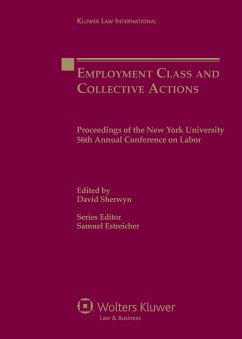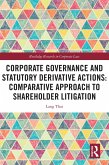Long regarded as a powerful means to seek individual damages against a corporate defendant, class actions have become a staple of the U.S. litigation system. In recent years, however, several highly significant Supreme Court decisions have weakened the commonality claims of defendants, particularly in workplace discrimination actions. In light of this background, the trends and prospects of employment class actions were the theme of the 56th annual proceedings of the prestigious New York University Conference on Labor, held in May 2003. This important volume reprints the papers presented at that conference, as well as some additional contributions. Among the considerable expertise brought to bear on this controversial subject, readers will find insightful analysis of such issues as the following: Effect of class actions on losing companies; Importance of class actions to Title VII enforcement; Obstacles to class litigation; Compliance and internal enforcement challenges for large employers; Opt-in vs. opt-out alternatives for class members; Value and effectiveness of pattern or practice test cases; Legal limits of group identity; Shifting of the burden of proof; Authority of arbitrators to proceed on a class wide basis; and Countering statistical claims of expert witnesses. Because class actions are based on tension - that between commonality and individuation - they tend to accumulate precedent along a spectrum from disconnected disparity to meaningful resolution. In this deeply informed and thought-provoking book, lawyers and academics concerned with both the interests of employers and of employees will proceed with increased awareness as they work on reconciling the practical and theoretical constraints of class litigation.
Dieser Download kann aus rechtlichen Gründen nur mit Rechnungsadresse in A, B, BG, CY, CZ, D, DK, EW, E, FIN, F, GR, HR, H, IRL, I, LT, L, LR, M, NL, PL, P, R, S, SLO, SK ausgeliefert werden.









